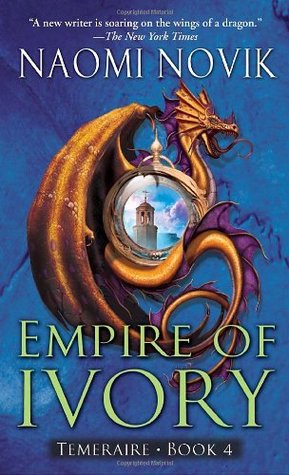Today I'm looking at the fourth book of the Temeraire series, Empire of Ivory. When we left off Captain Laurence and Temeraire were helping to evacuate remnants of the Prussian army from the besieged city of Danzig. When we rejoin our heroes they're making a mad dash for the coast of England pursued by French dragons. Despite firing signal flares it's only a shore battery that manages to keep the French dragons at bay and allow Temeraire, Iskierka, and the feral dragons to land safely in England.
Understandably they're perplexed by this situation and much to their dismay that the dragons of England have been struck down by a mysterious plague. Many of the dragons have been sick for a year or more and Britain faces the very real possibility of losing all its dragons. The strategic considerations are gravely concerning, but it's emotionally terrifying for the aerial corps as well because of the deep emotional attachment between the dragons and their crews. Temeraire, Iskierka, and the feral dragons have to protect the shores of England from invasion. When Temeraire accidentally gets exposed to infected dragons Laurence braces for the worst...until Temeraire fails to get sick. It appears Temeraire already had the illness during their trip to China and something, whether the environment of Cape Town or something he ate, fought the illness. Temeraire and his ill friends are packed back back up onto the Allegiance and dispatched back to Cape Town to find a cure.
The thing I liked most about this book was the result of the expedition to Cape Town and their search for the pungent mushroom which is the cure for the dragons' illness. As it was established previously in other books, expeditions into Africa's interior had disappeared without a trace leaving the interior of the continent a vast unknown. The assumption is that feral dragons are in such large populations that any expedition is simply killed. What our characters discover is that the interior is ruled by an organized empire, very similar to the Zulu nation, with the support of dragons who the Africans revere as reincarnations of their honored ancestors. The Africans have been willing to tolerate European interlopers, despite the ongoing slave trade, but with the arrival of European dragons the Africans assume the Europeans are making a serious bid for settlement. In response the Africans launch successful attacks not only against Cape Town, but all the major slave-trading ports up and down the African coast.
I liked this development in particular because it shows an advanced civilization in Africa, as well as a reference to an Incan empire in the Americas that kept Spanish colonialism at bay and the state of Mysore that has used their dragons to keep Britain at bay in India. With the Chinese culture which we saw in Throne of Jade, we see how multiple cultures, with the aid of dragons, have managed to curtail European encroachment, something that took off in the nineteenth century but the seeds of which were sewn in the eighteenth and seventeenth centuries. Granted, these are oversimplified versions of various global cultures, but it's not necessarily something I expected from a fantasy series. (Incidentally I also find it somewhat ironic that the deadly dragon-killing disease came from North America and infected European dragons in an inversion of the historical smallpox epidemic which killed upwards of 90% of the Native American population.)
Another theme that's been growing ever since at least the second book is Laurence and other people seeing dragons as people with rational minds, rather than highly intelligent animals. European cultures, at least, think of dragons as highly sophisticated animals that need to be tamed but you can't expect to reason with them. This is in decided contrast with China where dragons are practically equal members of society, and in Africa where dragons are leaders and advisers. As the series goes on the Europeans are going to be increasingly faced with the fact their dragons are just as intelligent, or perhaps more so, than their human companions.
Overall this was a good installment in the series and I look forward to more.
- Kalpar


No comments:
Post a Comment